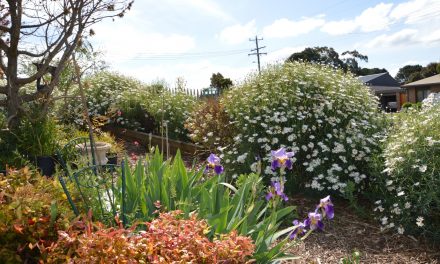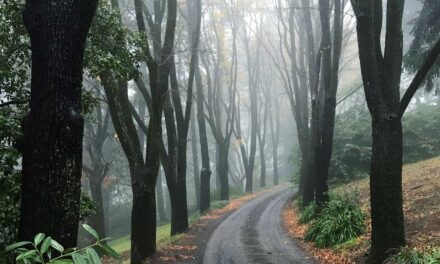Diane Beddison
Plant of the Month
Roses, Santolina, herbaceous Salvias, Hydrangea and those lovely native everlasting daisies (annuals and perennials). Too much to choose from for plant lovers.
Hydrangea will be looking great for the next few weeks. Yes, they can be thirsty, but old-fashioned lace caps can thrive in clay soil on the south side of the house with little extra water and have a long flowering period. From a landscaping perspective Hydrangea quercifolia are more useful. Tolerant of more sun and able to take dry spells once established they have beautiful leaf texture and lovely autumn colour.
Heatproof your Garden
If you haven’t mulched your garden, do it now. Water the garden well, add mulch and water again. Try coarse pine bark for a neat finish, euca mulch for natives or pea straw for productive gardens and soil improvement. For those in a high fire risk area, you may prefer to use an inorganic mulch such as gravel.
Check any automatic watering systems to see they are working correctly. Run all lines and look for damaged pipes and blocked drippers or sprayers which are not doing their job. Flush out the lines. Once you think your irrigation systems is fixed, check again and monitor it for a few days. Best time to water is early morning especially when a hot northerly wind is expected.
Cut the lawn higher over summer to retain moisture.
At Home in Style
Perhaps you’re spending summer at home. Why not redesign your space over summer and create your own oasis.
If you don’t have enough shade in your garden plant a heat tolerant deciduous tree. Snow pear is a wonderful small shade tree which is very attractive. If you are after summer colour, choose one of the many Crepe Myrtles 5 to 8 meters tall. If attracting birds is your priority, purchase one of the small evergreen Dwarf Corymbia ficifolia. These grafted flowering gums are small and colourful.
Install a bench seat in a shady spot for reading or relaxing after a busy day.
Why not grow some natives from seed? Karunga native nursery in Melbourne have a great range, however, it’s worth checking what your local nurseries carry. Some of the seeds I plan to try this summer are wild geranium, everlasting daisies and billy buttons.
Create a place for your children to play this summer. Perhaps you have some space under a healthy shade tree for a table and chairs. Cover the area with coarse tanbark and surround with hardy plants such as Mediterranean species, succulents or those native to Australia.
Encourage your children to connect with nature by asking them to help. Prepare a small area of soil by digging it over and incorporating compost. Give them the task of planting some mixed flower seeds direct into the soil for a quick win.
Help the creatures that rely on our gardens to survive summer. Keep bird baths full of clean water and add water to a shallow dish with rocks to make it safe for bees. Don’t over tidy gardens, beyond what’s required for fire concerns, as what we see as mess is probably home for many insects and lizards.
So, you are hosting a major birthday or a wedding in mid to late summer. Feed all your plants at least twice. In the summer heat, make sure you water the soil first and then apply a liquid product such as PowerFeed. Spray for fungal disease or insect attacks. Ask your nursery for an organic product and spray in cooler weather.
Fill in as many gaps as you can. Move plants and if you or a friend have some surplus perennials or annuals use them to fill the gaps.
Add instant interest and colour with shrubs in pots. Buy and borrow pots to jazz up your entertaining area, add interest around doorways and fill gaps in the garden, especially opposite windows. Place a plastic pot inside the final pot to keep your styling flexible. A few of my favourite small shrubs are geraniums, gardenia, cistus, banksia, correa and dwarf native frangipani. Select plant species according to what will be flowering at time of your event and include some colourful annuals.
Or Away Carefree
Give your garden a thorough watering in the two days before you leave. For a water-wise garden, filled with natives or succulents and tough Mediterranean plants, that may be enough. Otherwise, even if you have a watering system, ask a neighbour to check your garden twice weekly and hand water plants that look stressed.
Diane Beddison is a frequent visitor to Daylesford and the Principal of Beddison Garden Designs.





